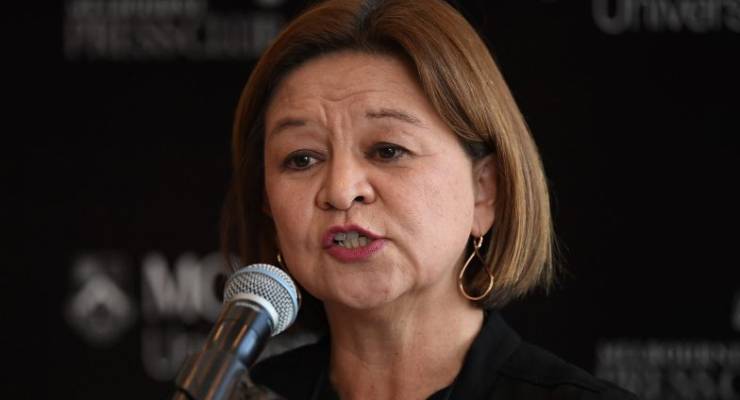
The job of ABC managing director is very likely the most difficult in the country. Some factors have been ever thus — you have virtually no control over your revenue, the ABC is an institution on which literally everyone in the country has both a view and a vested interest, the staff have a formal role in running the joint, you have to run a sprawling national institution bigger and with greater reach than any other media outlet in the country. But two key changes in the last twenty years have made a difficult job basically impossible.
First, one side of politics has abandoned the traditional consensus that independent public broadcasting is a worthwhile policy goal. The party of Malcolm Fraser, which was so committed to public broadcasting it established a second broadcaster, became the party of John Howard, that waged incessant war on the ABC, slashing its budget and bombarding it with vexatious complaints, which became the party of Abbott/Turnbull/Morrison, which not merely slashed the ABC’s budget and complained incessantly, but directly interfered with the broadcaster to try to sack journalists who displeased them. The political environment in which the ABC operates is now one of permanent culture war and political and ideological attempts to undermine the broadcaster.
The second is that the ABC is no longer merely a broadcaster, like it was until the 1990s, but a key online outlet as well. Not merely must it cope with the challenge of the internet to the traditional radio and television broadcast model, it must effectively use the internet to fulfill its charter as well. This requires a leader who is comfortable in broadcasting and understands journalism, but can also respond creatively to the challenge of digital media — something that has proven beyond most Australia media executives — while functioning effectively in a relentlessly hostile political environment. No one has that skill set in Australia or, quite possibly, anywhere. Or if they do, they would cost far more than the ABC could ever pay.
The challenge, then, for the ABC board, is to find someone who ticks at least some of those boxes, if not all of them. It’s not clear that Michelle Guthrie, selected by the ABC board under James Spigelman, ticked any at all, which is why she seemed out of her depth from the outset. But what of the ABC board itself? What skills does it have in identifying the appropriate candidate who ticks as many boxes as possible? The board is politically appointed — efforts to institute some form of vetting for that process having been abandoned by the government. Justin Milne’s primary qualification for the position seem to be his friendship with Malcolm Turnbull; Maurice Newman was a friend of the Liberal Party; Donald McDonald a friend of John Howard’s. None of them, or Spigelman, had broadcasting experience, and few board members under them did or do either.
Executive recruitment firms are supposed to address a lack of board experience in hiring executives, but what headhunters look for is shaped by what boards ask for, and the board and chair ultimately make the decision about whom to shortlist and appoint. As a result, candidates for the most difficult job in Australia are assessed by people with limited grasp of what the job entails or how best to address the challenges facing the organisation they lead. If Justin Milne’s idea of effectively managing the political environment in which the ABC operated was to pre-emptively buckle to complaints about journalists from politicians, it suggests a board with a spectacularly flawed understanding of the ABC and its role.
The entire structure of appointing the leadership of the ABC is flawed, because it maximises the chances the board will get an already very difficult decision wrong due to inexperience and incomprehension. And you don’t need to look too far beyond Justin Milne and Michelle Guthrie to see what happens when the mechanism fails.








“Faced with an important editorial decision, the ABC‘s managing director Michelle Guthrie went to dinner instead – thus proving, in my opinion, her unsuitability for such an important role.”
http://theluckygeneral.biz/2017/02/20/what-abcs-7-30-got-wrong-and-refused-to-correct-about-that%E2%80%8B-kennett-story/
Gillian Triggs would make a wonderul chairman, with the legal experience to ensure the charter is followed and political imterference gets short shrift.
The chances of the Coalition government appointing an excellent Chair of Triggs’ quality are Buckley’s & none.
What a wonderful idea.
She’d have my vote… oh wait, I haven’t one.
Nor do more than 25M citizens.
That power is confined to a bunch of ..err… umm, (ducks off to check defamation law) .. partisan political poltroons.
Too many are picked because they can’t see the bigger picture that lays beyond their short-sighted ideology.
Bernard you have identified precisely the issue and the problem. To get a good MD you need a good Board. And what interest does the coalition government have in getting a decent well qualified Board? The answer to which unfortunately is given by another commenter in relation to the idea of Gillian Triggs as chair.
The fact that Ms Guthrie thinks she improved anything at all with her restructure is delusional . I suspect she talked herself into it. It must have be so frustrating for Mark Scott looking on.
I seriously hope things improve. Is hearing David Thodey for Chair.